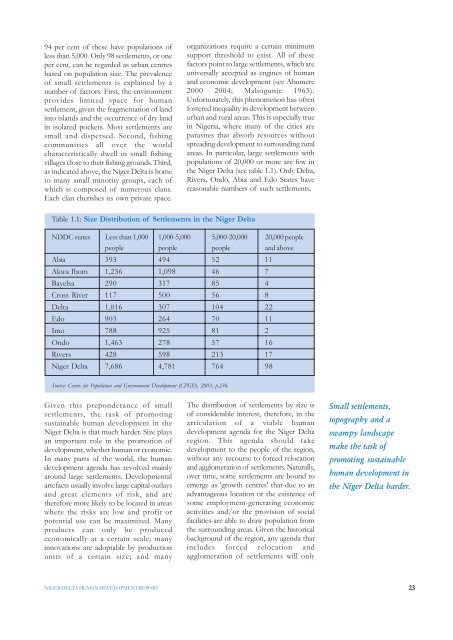Niger Delta Human Development Report - UNDP Nigeria - United ...
Niger Delta Human Development Report - UNDP Nigeria - United ...
Niger Delta Human Development Report - UNDP Nigeria - United ...
Create successful ePaper yourself
Turn your PDF publications into a flip-book with our unique Google optimized e-Paper software.
94 per cent of these have populations of<br />
less than 5,000. Only 98 settlements, or one<br />
per cent, can be regarded as urban centres<br />
based on population size. The prevalence<br />
of small settlements is explained by a<br />
number of factors. First, the environment<br />
provides limited space for human<br />
settlement, given the fragmentation of land<br />
into islands and the occurrence of dry land<br />
in isolated pockets. Most settlements are<br />
small and dispersed. Second, fishing<br />
communities all over the world<br />
characteristically dwell in small fishing<br />
villages close to their fishing grounds. Third,<br />
as indicated above, the <strong>Niger</strong> <strong>Delta</strong> is home<br />
to many small minority groups, each of<br />
which is composed of numerous clans.<br />
Each clan cherishes its own private space.<br />
Table 1.1: Size Distribution of Settlements in the <strong>Niger</strong> <strong>Delta</strong><br />
NDDC states Less than 1,000 1,000-5,000 5,000-20,000 20,000 people<br />
people people people and above<br />
Abia 393 494 52 11<br />
Akwa Ibom 1,236 1,098 46 7<br />
Bayelsa 290 317 85 4<br />
Cross River 117 500 56 8<br />
<strong>Delta</strong> 1,016 307 104 22<br />
Edo 903 264 70 11<br />
Imo 788 925 81 2<br />
Ondo 1,463 278 57 16<br />
Rivers 428 598 213 17<br />
<strong>Niger</strong> <strong>Delta</strong> 7,686 4,781 764 98<br />
Source: Centre for Population and Environment <strong>Development</strong> (CPED), 2003, p.236.<br />
Given this preponderance of small<br />
settlements, the task of promoting<br />
sustainable human development in the<br />
<strong>Niger</strong> <strong>Delta</strong> is that much harder. Size plays<br />
an important role in the promotion of<br />
development, whether human or economic.<br />
In many parts of the world, the human<br />
development agenda has revolved mainly<br />
around large settlements. <strong>Development</strong>al<br />
artefacts usually involve large capital outlays<br />
and great elements of risk, and are<br />
therefore more likely to be located in areas<br />
where the risks are low and profit or<br />
potential use can be maximized. Many<br />
products can only be produced<br />
economically at a certain scale; many<br />
innovations are adoptable by production<br />
units of a certain size; and many<br />
NIGER DELTA HUMAN DEVELOPMENT REPORT<br />
organizations require a certain minimum<br />
support threshold to exist. All of these<br />
factors point to large settlements, which are<br />
universally accepted as engines of human<br />
and economic development (see Abumere<br />
2000 2004; Mabogunje 1965).<br />
Unfortunately, this phenomenon has often<br />
fostered inequality in development between<br />
urban and rural areas. This is especially true<br />
in <strong>Niger</strong>ia, where many of the cities are<br />
parasites that absorb resources without<br />
spreading development to surrounding rural<br />
areas. In particular, large settlements with<br />
populations of 20,000 or more are few in<br />
the <strong>Niger</strong> <strong>Delta</strong> (see table 1.1). Only <strong>Delta</strong>,<br />
Rivers, Ondo, Abia and Edo States have<br />
reasonable numbers of such settlements.<br />
The distribution of settlements by size is<br />
of considerable interest, therefore, in the<br />
articulation of a viable human<br />
development agenda for the <strong>Niger</strong> <strong>Delta</strong><br />
region. This agenda should take<br />
development to the people of the region,<br />
without any recourse to forced relocation<br />
and agglomeration of settlements. Naturally,<br />
over time, some settlements are bound to<br />
emerge as 'growth centres' that-due to an<br />
advantageous location or the existence of<br />
some employment-generating economic<br />
activities and/or the provision of social<br />
facilities-are able to draw population from<br />
the surrounding areas. Given the historical<br />
background of the region, any agenda that<br />
includes forced relocation and<br />
agglomeration of settlements will only<br />
Small settlements,<br />
topography and a<br />
swampy landscape<br />
make the task of<br />
promoting sustainable<br />
human development in<br />
the <strong>Niger</strong> <strong>Delta</strong> harder.<br />
23










